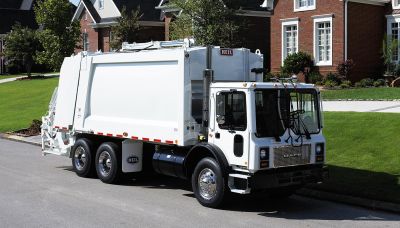Waste Hauler Program

Click Here to Access our Secure Quoting Platform
Description of operations: Garbage collectors pick up trash from residential and/or commercial customers along established routes and transport it to an approved landfill. Some operate under a contract with a municipality where the municipality provides the vehicles and the collection firm supplies the labor, including supervision. Some contract with businesses and residents or a governmental entity and use their own employees and vehicles to deposit trash at a landfill owned by others. Still, others provide complete services for municipalities, including vehicles, personnel, and landfill operations. All operations are subject to both federal and state environmental regulations. This narrative does not discuss landfill operations.
Property exposures may be limited to electrical, heating and cooling systems in an office. If the garbage collector repairs, refuels and maintains its own vehicles on premises, exposures will include flammable liquids, including gasoline and diesel fuel, and heat-producing activities such as welding. Flammable liquids and heat-producing activities must be separated from combustibles to prevent fire and explosion. All spray-painting should be conducted in a spray booth with explosion-proof fixtures. Poor housekeeping is a serious fire hazard. Unless stored and disposed of properly, oily rags can spontaneously combust and cause a fire. The condition and controls of fuel tanks, whether above or below ground, are important for both property and environmental liability.
Inland marine exposures include accounts receivable for billings, computers, and valuable papers and records for licenses, contracts, and regulatory compliance information. If the insured conducts operations such as street cleaning, contractors’ equipment coverage may be needed. Records should be duplicated and be stored off site.
Crime exposures are from employee dishonesty. Background checks, including criminal history, should be performed on all employees handling money. All billing, ordering, and disbursements must be separate duties. Outside audits should be conducted on a regular basis. If drivers have access to customers’ premises, the exposure to theft of customer property or customer identity theft increases.
Premises liability exposures are very low due to limited public access. There is little off premises exposure unless the business provides additional services to customers. Most off premises exposures relate directly to truck operations and are covered under the business automobile policy. Contracts may expose the operation to additional liability, especially contracts with homeowners associations, municipalities and commercial operations. The location may be an attractive nuisance to children or trespassers. It should be fenced and lighted to deter unauthorized access.
Environmental impairment exposure can be high due to the storage of fuel and the waste disposal of fluids used for servicing and repairing garbage trucks. All tanks, underground or above, must meet state or federal regulations and be routinely tested for leakage. Spillage and leaking of pollutants into the air, ground, or water can result in high cleanup costs and fines. Spill procedures must be in place to prevent the accidental discharge of sludge from water reclamation systems used in washing trucks. Contracts should be in place to dispose of all environmentally dangerous chemicals. Additional exposure comes from overturn or spillage of hazardous waste material included in garbage carried should a truck being involved in an accident. If there are underground storage tanks, a UST policy will be needed.
Automobile exposures are very high. Garbage trucks are heavy. Their operation on narrow streets in residential areas may cause serious bodily injury and property damage losses. Equipment used to lift garbage receptacles can malfunction, dropping items on structures, other vehicles, or bystanders. Debris can fly from the truck, causing damage to other vehicles on the road. Trash taken to the dump can damage buildings, equipment, and other vehicles using the facility. Backing up garbage trucks can be deadly. Video devices that reveal objects and people behind the vehicle can be very helpful in preventing damage and injuries. All drivers must have valid licenses for the vehicles being driven. In some cases, a commercial driver's license (CDL) or Haz-Mat license will be required. MVRs must be acceptable and checked on a regular basis. Random drug and alcohol testing should be required. Vehicles must be maintained, and records kept in a central location. Accidents can result in the spillage of diesel fuel or other operating fluids from within the truck, requiring cleanup.
Workers compensation exposures are very high. Truck drivers and crewmen can be injured or killed in accidents or by other drivers as they gather trash. Garbage collectors must operate in adverse traffic conditions such as inclement weather or road construction. Common injuries include cuts, burns, abrasions, back sprains, and hernias from lifting of heavy trash receptacles or odd-sized bundles, hearing impairment from noise, foreign objects in the eye, and slips and falls. If they handle hazardous materials, they may contract diseases if the materials are not handled correctly. Most trash collection vehicles are equipped with trash compaction devices that could crush an employee. Garage employees can be injured by vehicles falling from hoists, strains, sprains and other lifting injuries. Good housekeeping is critical to reduce injury from slips, trips, and falls. Burns, eye injuries, and respiratory problems can occur with welding and painting. Dermatitis can result from employees coming into contact with harsh cleaning detergents. Repair areas should be properly ventilated. Proper safety equipment is required.
Minimum recommended coverage:
Business Personal Property, Accounts Receivable, Computers, Valuable Papers and Records, Employee Dishonesty, General Liability, Employee Benefits Liability, Environmental Impairment Liability, Umbrella, Business Auto Liability and Physical Damage, Hired and Nonownership Auto, Workers Compensation
Other coverages to consider:
Building, Business Income and Extra Expense, Earthquake, Flood, Leasehold Interest, Real Property Legal Liability, Contractors Equipment, Cyberliability, Employment-related Practices Liability, Stop Gap Liability, Underground Storage Tank





